What is a Free Employment Verification Letter?
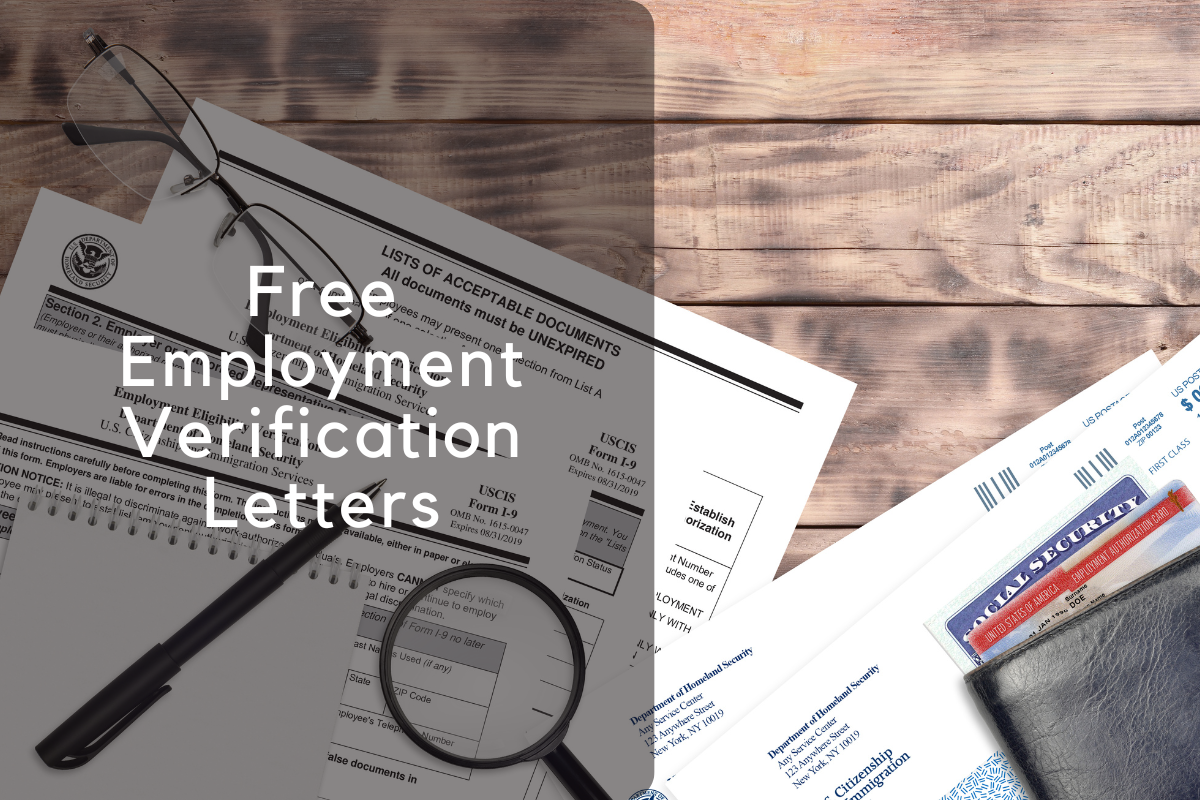
An employment verification letter is an official document provided by an employer to confirm the details of an employee’s job status, title, salary, and employment duration. This letter serves as proof of employment, which is often needed by employees for various personal or professional purposes, such as applying for loans, renting apartments, or verifying employment history for future job applications.
What is a Free Employment Verification Letter?
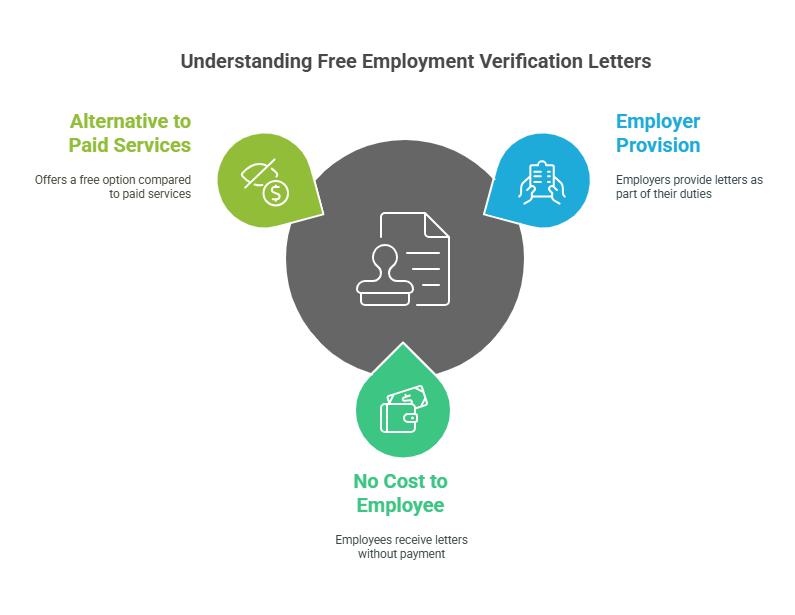
A free employment verification letter is a document provided by an employer at no cost to the employee. It serves the same purpose as a paid verification letter but is typically issued without any charge. While some companies or third-party services may charge a fee for generating such a letter, many employers will provide this verification service as part of their regular administrative duties.
Difference Between a Free Employment Verification Letter and a Paid One
The main distinction between a free and paid employment verification letter lies in how they are obtained and who is involved in the process. A free letter is directly issued by the employer, usually through the Human Resources (HR) department. In contrast, a paid verification letter often involves third-party services that expedite the process, verify the information more quickly, or provide additional details at a cost.
When and Why Do Individuals or Companies Need an Employment Verification Letter?
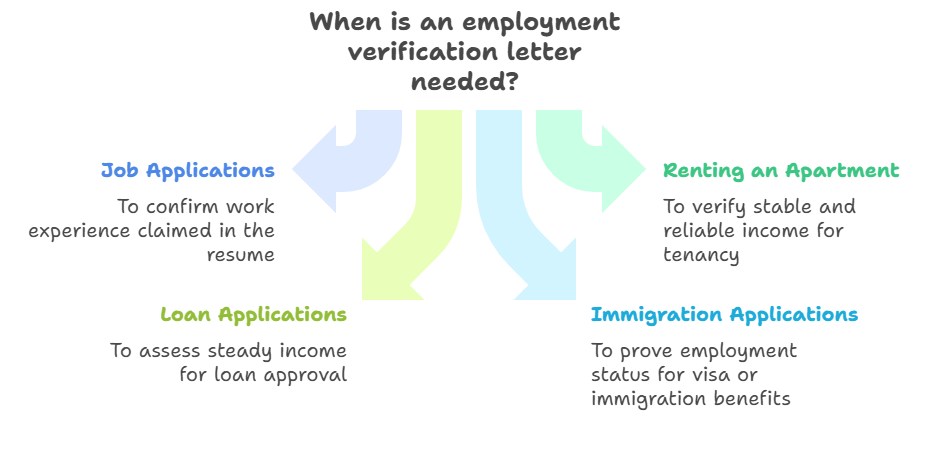
An employment verification letter may be required in a variety of situations, including:
- Job Applications: Employers often request a verification letter to ensure that the candidate has the work experience claimed in their resume.
- Renting an Apartment: Landlords may ask for a verification letter to confirm that the tenant has stable and reliable income.
- Loan Applications: Banks and financial institutions may request this letter to determine if the applicant has a steady income, especially for personal or home loans.
- Immigration Applications: Those applying for a visa or other immigration benefits might need to prove their employment status.
What Information is Included in an Employment Verification Letter?
An employment verification letter typically includes the following key details:
- Job Title: The official position held by the employee within the company.
- Employment Dates: The start and end date (if applicable) of the employee’s tenure with the company.
- Salary Details (if applicable): The employee’s compensation, either as a salary or hourly rate, may be included, but this depends on the purpose of the verification.
- Employer’s Contact Information: This typically includes the name, title, company name, phone number, and email address of the person issuing the letter.
- Signature: The letter must be signed by an authorized representative from the company, such as the HR manager, supervisor, or other official personnel.
How to Obtain a Free Employment Verification Letter
Obtaining a free employment verification letter can be a straightforward process, but it depends on the employer’s policies and the individual’s specific needs. Below are the different methods individuals can use to obtain a verification letter, whether from their current or former employer, or by writing it themselves.
How to Request a Free Employment Verification Letter from a Current or Former Employer
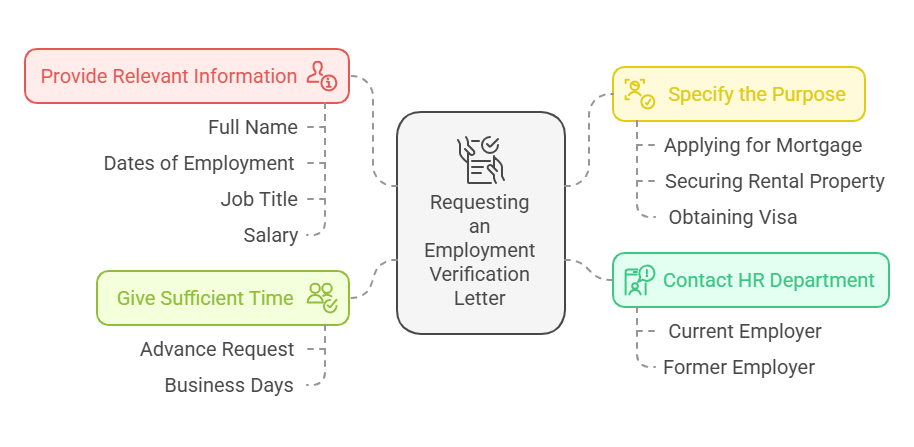
The easiest way to obtain a free employment verification letter is to request one directly from your current or past employer. Here are the steps involved:
- Contact the HR Department: Most companies have a Human Resources (HR) department that handles employment verification requests. Contact them to inquire about the process for obtaining the letter.
- Provide Relevant Information: Be sure to provide any necessary details, such as your full name, dates of employment, and the specific information you need (e.g., job title, salary). Some employers may have specific forms or requirements for verifying employment.
- Specify the Purpose: Clearly state the purpose of the letter. This will help the HR department tailor the letter to meet your specific needs (e.g., applying for a mortgage, securing a rental property, or obtaining a visa).
- Give Sufficient Time: Depending on the company’s procedures, it may take several business days to process your request. Be sure to request the letter well in advance of any deadlines.
How to Write a Free Employment Verification Letter Yourself
If you’re unable to obtain the letter from your employer, or if you need to write it yourself for a third-party verification, you can follow these steps to create your own verification letter.
- Start with Your Contact Information: Include your full name, address, and phone number at the top of the letter. This helps ensure the recipient can contact you if necessary.
- Include the Employer’s Details: Add the name of the company, their address, and contact information.
- State the Purpose: Clearly mention the purpose for which the employment verification letter is being written.
- Include Employment Details: Provide the necessary employment details, such as job title, employment dates, and salary (if applicable). Be as clear and specific as possible.
- End with a Professional Closing: Finish the letter with a formal closing (e.g., “Sincerely,” or “Best regards”) and include your signature or the signature of the HR representative if you’re writing it on behalf of the company.
Using a Template to Write a Free Employment Verification Letter
If you’re unsure how to structure the letter, using a template can be very helpful. Below is a basic outline you can follow:
- [Your Name]
- [Your Address]
- [Your Phone Number]
- [Date]
[Employer’s Name]
[Employer’s Address]
[Employer’s Contact Info]
Dear [Recipient’s Name],
I am writing to confirm the employment of [Employee Name], who worked at [Company Name] from [Start Date] to [End Date] in the position of [Job Title]. During their time with us, [Employee Name] was a valuable member of our team.
For any further information, please feel free to contact me at [Phone Number] or [Email Address].
Sincerely,
[Your Signature]
[Your Name and Title]
Using a Third-Party Service to Obtain a Free Employment Verification Letter
If you’re having difficulty obtaining the letter from your employer or writing it yourself, third-party services can assist in providing this service. For example, Rapid Hire Solutions offers assistance in obtaining employment verification letters for individuals and businesses. They help streamline the process, ensuring you have the correct documentation when you need it.
Rapid Hire Solutions can also assist in verifying employment details, especially for companies that require quick and professional employment checks for hiring or other purposes.
Additional Tips for Obtaining a Free Employment Verification Letter
- Keep Records: Maintain copies of all correspondence and requests for the employment verification letter.
- Request Early: Be proactive and request the letter well in advance to avoid delays, especially if it’s needed for a time-sensitive purpose.
- Be Clear on What You Need: Ensure that you specify exactly what details you need included in the letter to avoid miscommunication.
Legal Aspects of Employment Verification Letters
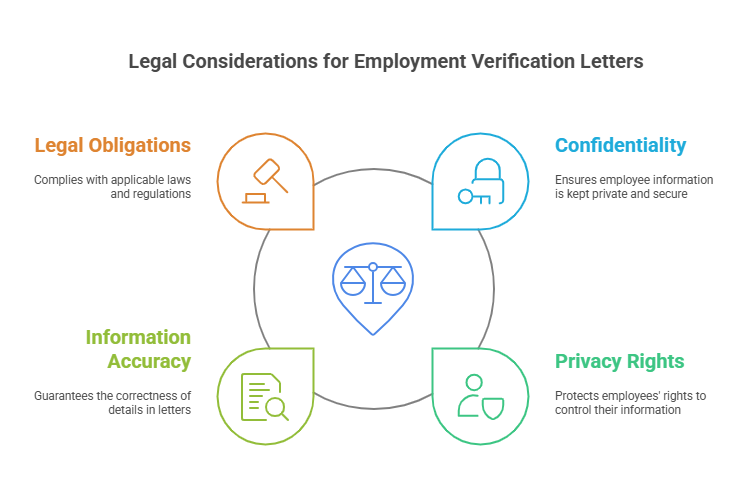
While employment verification letters are commonly used, there are several legal considerations that both employees and employers need to keep in mind:
- Confidentiality of Employee Information: Employers are generally required to maintain the confidentiality of employee information. This means that only specific information should be disclosed in an employment verification letter. Employers should be cautious not to share any personal or sensitive details that are not relevant to the purpose of the letter. For example, salary details or reasons for leaving a job may only be included with the employee’s consent.
- Employee Privacy Rights: Employees have the right to know when their employment information is being shared with a third party. Employers should get the employee’s consent before releasing certain information unless there is a legal obligation to disclose it (for instance, a government agency request).
- Accuracy of Information: Employment verification letters must contain accurate information. Employers could face legal consequences if the letter contains incorrect or misleading information that could harm the employee’s reputation or career prospects.
- State and Local Laws: Some states and local jurisdictions have specific regulations governing the release of employment information. For instance, in some places, employers must obtain written consent before releasing any information beyond basic verification of employment dates and job title.
- Employers’ Legal Obligations: While not legally required to provide a verification letter, employers often do so as a courtesy. However, once a letter is requested, the employer must ensure that the information provided is truthful, accurate, and legally compliant.
FAQs about Employment Verification Letters
Here are some frequently asked questions regarding employment verification letters:
Who is allowed to request an employment verification letter?
Typically, third parties such as lenders, landlords, government agencies, or prospective employers may request employment verification letters. However, employees must give consent for their information to be shared.
Is an employer obligated to provide an employment verification letter?
No, employers are not legally required to provide employment verification letters. However, many employers do so as a standard practice. If an employer chooses not to provide one, they must still comply with local privacy laws.
Can I request a free employment verification letter?
Yes, employees can request a free employment verification letter from their current or former employer. Employers typically provide these letters free of charge, as it’s a standard part of employment practices.
How accurate must the information in an employment verification letter be?
The information in an employment verification letter must be completely accurate. Providing false information can lead to legal consequences for both the employer and the employee, especially if it affects employment prospects or financial matters.
Can I provide an employment verification letter from a past employer?
Yes, a past employer can issue an employment verification letter, provided that the details are correct and the company is still in business. If you left the company on good terms, it’s generally easy to request such a letter from them.
Conclusion: Importance of Employment Verification Letters
In summary, employment verification letters are vital tools used to confirm an individual’s employment history, which is necessary for various professional, financial, and personal purposes. Whether you’re applying for a job, securing a loan, or renting a home, having an accurate and properly drafted employment verification letter can make all the difference.
It’s important to follow the correct legal protocols when requesting or providing such letters. Both employees and employers should be aware of their rights and responsibilities when it comes to sharing employment information.
For individuals or businesses seeking help in obtaining or verifying employment information, services like Rapid Hire Solutions can assist in ensuring that the employment verification process is completed professionally and in compliance with all legal requirements.
By understanding the process, knowing when to request a verification letter, and ensuring compliance with privacy laws, you can ensure a smooth and efficient experience when dealing with employment verifications.
